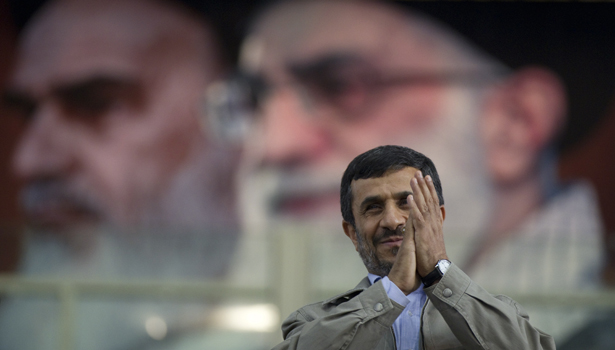Partisanship in Tehran Could Slow Nuclear Program
Mahmoud Ahmadinejad wants to give Iran the bomb to secure his legacy--but his domestic opponents don't want to see him succeed

In about a month, Iran's firebrand president Mahmoud Ahmadinejad will once again fly to New York to attend the opening of the UN General Assembly. Being the lightning rod that he is, there are sure to be vehement protests and massive public outcry over his mere presence, much less whatever vile exhortations he has in store for us this year. Although this particular stage drama has become predictable over the last six years, now there is a new twist: Ahmadinejad's near-total political impotence back home in Iran.
Ahmadinejad's recent fall from grace has led many observers to write him off as a meaningful force in Iran. One analyst I spoke to recently said Ahmadinejad has become more like a foreign minister than a president, able to go on trips and give speeches, but not much more.
Iran's presidency has always been a relatively weak institution. According to the constitution of the Islamic Republic, the president is subservient to the supreme leader, who is vested with ultimate political and religious authority. Even among his peers in government, Ahmadinejad has always had to jockey for influence against military, clerical, and technocratic factions. But in recent months, Ahmadinejad has fallen out of favor with his colleagues -- and he has fallen hard.
The reason for the dispute lies in Ahmadinejad's controversial choice of advisers, especially his closest adviser Esfandiar Rahim-Mashaei, whose views on clerical rule in Iran have made him an enemy of many of the country's most powerful figures. But the source of the conflict is less important than its outcome: Ahmadinejad is now widely regarded as a lame duck president.
This could be good news, depending on how credible you find recent intelligence calculations. According to one nation's assessment given to the Associated Press, Ahmadinejad is the leading voice within Iran's inner circle pushing to develop nuclear weapons. Many in Washington instinctively viewed this report as a sign of Iran's devious nuclear intentions, but there is another way of looking at it: Ahmadinejad, currently at the nadir of his presidency, is unlikely to convince his colleagues to develop a nuclear arsenal because he is opposed by Iran's clerics who are far more powerful.
If you're afraid of an Iran with a nuclear weapon, right now there is no one you would rather have pushing for an overt military program more than Mahmoud Ahmadinejad, precisely because he has fallen out of favor with Tehran's leaders.
It makes sense that Ahmadinejad would advocate sprinting across the nuclear finish line as a way of salvaging his legacy. If the country builds a nuclear weapon during his presidency, history will remember him as the one who vaulted Iran to great power status. For exactly this reason, however, his clerical opponents are likely going to continue to oppose finishing a bomb in order to deny him that great legacy.
Therefore, absent some unforeseen change, it is reasonable to assume that Iran will not move forward with building a nuclear bomb at least until Ahmadinejad leaves office in 2013 -- and quite possibly later. Does that mean the West can use this time to achieve a diplomatic breakthrough with Iran? Most likely not.
Many Iran experts have viewed Ahmadinejad as Tehran's most ardent advocate of negotiations with the United States. Some U.S. officials have said Ahmadinejad can't possibly be for finishing a bomb because he's more "moderate" than Supreme Leader Khamenei and more open to talks with the West. And he may be; these two positions -- being in favor of both weaponization and negotiations - aren't mutually exclusive.
Unfortunately, for anyone hoping the U.S. and Iran will reach a negotiated solution, Ahmadinejad is a crummy advocate to have on your side.
Ahmadinejad is a politician, and like any other politician he cares about how he will be remembered in the history books. For an Iranian president, there are few more attractive prospects than to be the man who brought Iran and the U.S. back together again. Despite the constant rhetoric and "Death to America" chants, Iran's elected politicians crave the prestige and legitimacy that a reunion with the West would bring to their country. Ahmadinejad's two most recent predecessors each tried to negotiate a rapprochement with the U.S., and both failed. If Ahmadinejad were to preside over a negotiated agreement that ushers Iran back into the good graces of the international community, he would get the credit.
Yet once again, his clerical opponents are not presently inclined to allow him any such credit. Thus, they will most likely undercut any potential realignment with the West at least until Iran's next president takes office in 2013.
So what does all this mean for the US? Unfortunately, it means the Iran issue is likely to remain unchanged in any meaningful way for at least the next two years. Iran will continue to develop its nuclear capability; the West will continue to be threatened by this ongoing progress, taking steps to pressure Iran with further sanctions, sabotage, and covert actions. For as long as Iran's current political context holds, Tehran can be expected to remain divided over the prospects of both weaponization and a negotiated solution.
Although the next two years may be uniquely uneventful, policymakers in Washington don't have the luxury of taking a vacation. In order to prepare for when Iran's political deadlock ends, the US must take steps now to build confidence on both sides of the negotiating table. That way, when the logjam breaks, we can rightly hope that it will break our way.